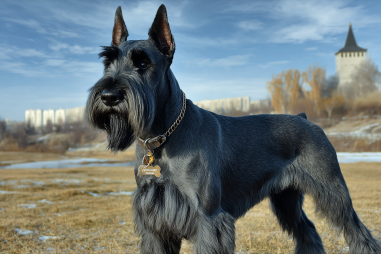Giant Schnauzers are known for their intelligence, loyalty, and striking appearance, making them a beloved choice for families and dog enthusiasts alike. However, like all dog breeds, they come with their own set of health considerations that owners should be aware of to ensure their pets live long, happy lives. In this article, we’ll explore some of the most common health problems that Giant Schnauzers may face, how to recognize potential signs of illness, and practical steps to prevent these issues through proper care and nutrition.
Overview of Giant Schnauzer Health
The Giant Schnauzer is a robust and athletic breed, originally bred in Germany as a working dog. Generally, they have a strong constitution, but their size and genetic background predispose them to certain health conditions. On average, Giant Schnauzers live between 10 to 12 years, although with vigilant care, many can exceed this age. Understanding their typical health profile helps owners anticipate and manage potential challenges effectively.
Common Genetic and Breed-Specific Issues
Several health problems are known to affect Giant Schnauzers more frequently than other breeds. Awareness of these can help owners and veterinarians monitor for early symptoms and implement preventive strategies.
- Hip Dysplasia: One of the most common ailments in large breeds, hip dysplasia is a malformation of the hip joint that leads to arthritis and pain. It can severely impact mobility if left unmanaged.
- Hypothyroidism: This is a condition where the thyroid gland produces insufficient hormones, resulting in weight gain, lethargy, and skin problems.
- Autoimmune Disorders: Giant Schnauzers can be prone to autoimmune diseases such as autoimmune hemolytic anemia and autoimmune thyroiditis, which require careful monitoring and treatment.
- Bloat (Gastric Dilatation-Volvulus): Large, deep-chested dogs like the Giant Schnauzer are at risk for bloat, a life-threatening condition where the stomach twists and traps gases.
- Cardiac Issues: Dilated cardiomyopathy and other heart diseases can affect Giant Schnauzers, emphasizing the need for regular cardiovascular check-ups.
- Eye Problems: Progressive Retinal Atrophy (PRA) and cataracts have also been reported within the breed, which can lead to vision impairment or blindness.
Signs and Symptoms to Monitor
Spotting health problems early is critical in providing effective treatment and maintaining your Giant Schnauzer’s quality of life. Some important signs to watch for include:
- Difficulty or reluctance to move, especially jumping or climbing stairs, which could indicate joint or hip issues.
- Changes in appetite or sudden weight gain or loss.
- Persistent coughing, difficulty breathing, or irregular heartbeats.
- Lethargy or decreased activity levels beyond normal tiredness.
- Visible swelling or bloating in the abdomen, especially if accompanied by restlessness or discomfort—this could signal bloat and needs urgent vet attention.
- Excessive scratching, hair loss, or skin irritations that might indicate thyroid problems or allergies.
- Changes in vision such as bumping into objects or cloudiness in the eyes.
Preventative Care and Routine Health Checks
Preventative healthcare plays an essential role in catching problems early and maintaining your dog’s health.
- Regular Veterinary Visits: Schedule bi-annual vet check-ups for your Giant Schnauzer. These visits usually include weight checks, dental exams, heart and lung auscultation, and possibly blood work to detect underlying conditions such as thyroid imbalances or early kidney disease.
- Hip and Joint Screening: Consider having your dog’s hips evaluated by an orthopedic specialist, especially before breeding or competing in dog sports.
- Vaccinations and Parasite Control: Stay current on vaccinations, flea, tick, and heartworm preventatives.
- Dental Care: Regular teeth brushing and professional cleanings can prevent dental disease, which can impact overall health.
Nutrition’s Role in Health
Proper nutrition is foundational for a Giant Schnauzer’s health. Feeding a balanced diet tailored to their size, age, and activity level helps support their joints, immune system, and coat health.
- High-Quality Protein: Essential for muscle maintenance and overall vitality.
- Joint Supplements: Ingredients like glucosamine and chondroitin can be beneficial, especially for large breeds prone to joint issues.
- Omega-3 Fatty Acids: Help reduce inflammation and promote healthy skin and coat.
- Weight Management: Overweight dogs are at a higher risk of hip dysplasia, heart disease, and diabetes, so portion control and monitoring body condition are vital.
It’s advisable to consult your veterinarian or a veterinary nutritionist to choose the optimal diet or supplements for your Giant Schnauzer’s specific needs.
Veterinary Care Recommendations
Besides routine check-ups, there are specific veterinary care recommendations to support your Giant Schnauzer’s health:
- Genetic Testing: If you are acquiring a puppy, request health clearances and genetic testing reports from breeders to ensure the dog is free from common inherited diseases.
- Early Screening for Cardiac and Eye Conditions: Annual heart exams and ophthalmologic evaluations can help detect problems before they become severe.
- Preventive Surgery or Treatments: Discuss the pros and cons of procedures such as spaying/neutering and if your dog benefits from early interventions in certain conditions.
- Emergency Preparedness: Educate yourself on the signs of acute issues like bloat and establish an emergency care plan with your veterinarian.
Building a trustworthy relationship with your vet can ensure personalized care and timely interventions for any health concerns.
Caring for Your Giant Schnauzer’s Health: The Path Forward
Caring for a Giant Schnauzer requires dedication to their physical and emotional well-being. By understanding the breed’s common health problems and proactively monitoring their symptoms, you can significantly enhance their quality of life. Incorporating regular veterinary visits, maintaining a balanced diet, and fostering an active lifestyle are key pillars of their health maintenance.
While no one can predict every health challenge, informed and attentive care gives your Giant Schnauzer the best chance at a long, joyful companionship. Remember, early detection and prevention are far more effective than treating advanced illnesses, so stay vigilant, give plenty of love, and enjoy the rewarding experience of sharing your life with this amazing breed.







